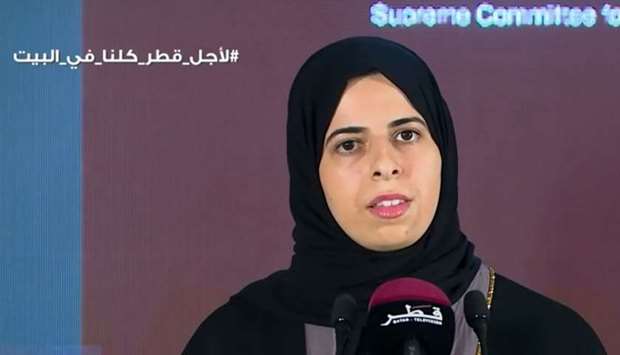HE Lolwah bint Rashid bin Mohamed AlKhater, the Spokesperson for the Supreme Committee for Crisis Management, has reiterated the absolute transparency adopted by Qatar in conveying facts related to the novel coronavirus (Covid-19) outbreak.
‘It hoped that this matter would be appreciated by everyone. This is for the simple reason that some depend on numbers that are circulated in general through various means of communication without checking for their accuracy,’ she told a press conference on Wednesday evening.
HE AlKhater stressed the importance of obtaining information from official sources and authorities, as there are official bodies that provide and make available these numbers continuously, on a daily basis, with great accuracy.
‘Qatar's approach of dealing with the crisis is a scientific one, as a scientific and medical solution to this problem is sought, and not a media solution, because that will not solve the root causes of the problem.
‘There are some parties and countries that resort to certain means which include not revealing the numbers, and calculating them in an unscientific way, such as announcing numbers that are in fact virus infections for citizens and generally declared as if they are all infections in the country,’ she said stressing that such calculations are not accurate, and Qatar does not follow such approaches.
HE AlKhater said that Qatar relies on internationally approved medical tests to detect infections. She presented an analysis of Covid-19 in Qatar, starting with the large increase in cases of infection announced on March 20, which was more than 200 at the time, and the subsequent decline and stability, then rise again in recent times.
‘The rise in the numbers recorded on March 20 came after the discovery of the transmission chains in Qatar, among expatriates in certain regions of the country, the most important of which is the currently closed Industrial Area,’ she said.
HE AlKhater emphasised that the government's response was quick and consisted of closing that area and providing mobile health units, ambulances and other measures.
The Ministry of Public Health carried out a survey there, she said, noting that the number of cases has begun to decline in this region.
Concerning the later spike in Covid-19 cases, she explained it was due to the return of Qataris from abroad, especially from Europe, and other countries.
The top official stated that Qatar witnessed relative stability after the second wave of Covid-19 cases related to the return of Qatari citizens from abroad.
‘This rise that we are currently witnessing is due to the return of Qatari citizens from abroad, in addition to the technical reason, which is the use of new case-detection devices that allow more cases to be tested in a shorter time and greater numbers.
‘This is a healthy indicator, as it relates to the discovery of cases that already exist, and should be dealt with scientifically and systematically.
‘The second chain of transmission between Qataris coming from abroad is witnessing an increase in numbers, while there is stability in the cases recorded between residents,’ she said.
She said the reason for the increasing number of infections among Qataris is that many people coming from abroad do not adhere to the conditions of safe distance and quarantine.
She urged all to strictly adhere to the precautionary measures and quarantine conditions.
‘The primary safety line is the conscience of people and their control over themselves, more than monitoring by the authorities.
‘Some people are wondering why the number of tests being conducted in Qatar is relatively less compared to some other countries. This is due to methodological and scientific reasons as Qatar uses only devices that have been proven effective and internationally recognised by the World Health Organisation and official bodies, while some other countries have chosen to use devices that are still under experiment or devices and methods in which the error rate is very high.
‘Qatar is using the right scientific approach, as more than 22,000 accurate tests were carried out until March 31,’ she said.
HE AlKhater pointed out that 89% of Covid-19 infections in Qatar are mild, and only 3% are very serious, with 8% recovering cases, in addition to the two deaths of patients who were suffering from chronic diseases.
There are currently 37 cases in intensive care, while 12 have been discharged. As much as 84% of the infections were reported from people in quarantine, which indicates that the quarantine mechanism is useful and working prpoerly. Among the Covid-19 cases in Qatar, 89% are males.
Regarding the age of those with Covid-19 infection, she said 31% are between 25 to 34 years, 25% between 35 to 44, 18% between 45 to 55 years, 10% range from 55 to 64 years, and 3% are over the age of 64.
‘What is relatively positive in these statistics is that the proportion of people infected with the virus above the age of 55 does not exceed 13%, given that greater the age, especially in the presence of chronic diseases, more the care is required,’ she observed.
On the recovery of cases, HE AlKhater said 79% are males. While 39% of recovery cases are for those between 25-34 years, 23% are between 45-54 years, 5.6% between 55-64 years, and 5.7% over 64 years.

